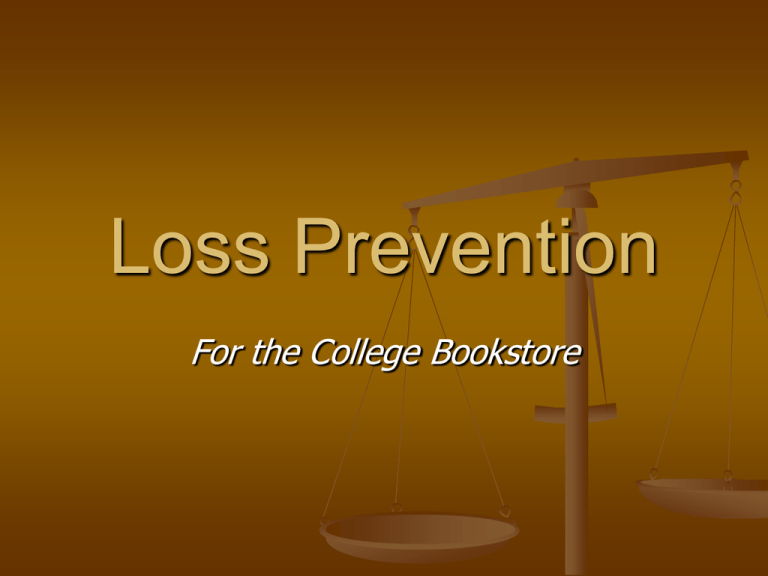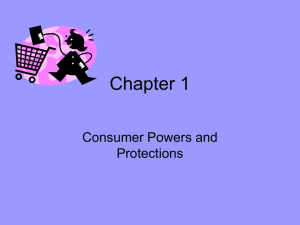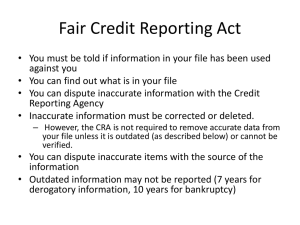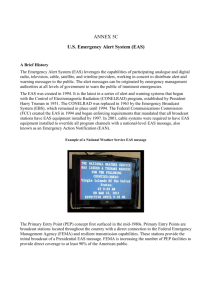Loss Prevention Session - California Association of College Stores
advertisement

Loss Prevention For the College Bookstore Presenter: Chet A. Cohen Corporate Loss Prevention Manager, Associated Students UCLA Fourteen (14) years at UCLA Previously worked for Gap Inc. and Target Corp. Member of ASIS (American Society of Industrial Security) Member of LAAORCA (Los Angeles Area Organized Retail Crime Association) Member of NACP (National Association of Chiefs of Police) Major Issues An Overview Shrink Textbook Theft Textbook Refund Fraud Physical Security/EAS Uniformed Security vs. Plainclothes Staff ORC Civil Demand Safety Shrink Defined as inventory losses, either by theft (internal and external), administrative errors and accounting errors $37 billion in 2011 50% internal (employees) 40% external (customers and vendors) 10% other Direct threat to store revenue and profitability Combated by strong deterrent policies, organizational standards and leadership Zero tolerance Textbook Theft The #1 theft threat to college bookstores Textbooks are equal to cash – fastest turnaround of any commodity sold (or) stolen at a college bookstore Preventing these types of theft is paramount There are a number of ways this can be accomplished: EAS (electronic article surveillance) systems, bag checks, clerk services and aggressive customer service are all ways to combat and deter textbook theft Textbook Refund Fraud Stolen textbooks are easily sold back for cash Retailers that do not ID book buyback sellers are making it easy for the criminals to get away with it Requiring a valid (government issued ID) DL or Student ID will deter instances of fraudulent returns Limiting quantities of the same title and capping the return eligible dollars are additional ways to combat refund fraud Advisories, working with your association partners Physical Security/EAS Visible CCTV (closed circuit television) cameras Cable-locking high-end products Reverse positioning of hangars on displays adjacent to exits Staffing appropriately through out the store and offering customer service to all guests Loss-control signage in fitting rooms EAS (Electronic Article Surveillance) systems EAS antennas can be floating at the exit doors or attached to the door frames All merchandise products can be tagged (soft or hard tags) Uniformed vs. Plainclothes Staff Uniformed security officers patrolling the store Being visible and able to offer customer service Can respond to EAS alarm activations Deters the folks “on the fence” about shoplifting Plainclothes staff are able to quietly investigate theft and make apprehensions With the uniformed staff on general patrol in the store, plainclothes personnel can focus investigations on highend products and/or internal issues ORC ORC (Organized Retail Crime) Not your grandfathers “mob” Well-organized, well-funded groups paid to steal significant amounts of merchandise in a short time Move from store to store in groups of bandits and lookouts Sold on the black market, swap meets and even back to primary sellers Estimated $20 billion in ORC crime in 2011, will be even higher in 2012 Not flash-mobs Civil Demand Legal term used by state legislatures that allow retailers to assess a civil fine unto a person caught shoplifting In California, Penal Code 490.5 allows retailers and libraries to charge up to $500 per incident for acts of theft A conviction in court is not required Its up to the retailer to set the fine amount The amount does not have to be based on the value of the item stolen The fine is guided by the principle that allows the retailer to recover some monies from losses and/or the cost of employing a loss prevention department and maintaining lp systems Civil Demand CONT’D Nevada state law – Code 597.860 allows for retailers to assess a civil fine from $100 up to $250 per incident plus the value of the non-sellable goods. Oregon state law – Statute 30.875 allows for civil remedy again between $100-$250 plus the cost of the non-sellable goods, not to exceed $500. Washington state law – allows retailers to assess a civil fine up to $200 after attempting (twice) to have the thief pay for the stolen items. Safety This is a major component of any loss prevention or asset protection function Maintaining a safe work environment for employees and customers will cut down on accidents and claims This will reduce your workers’ compensation rates Lost-time accidents can run into the hundreds of thousands of dollars for an organization All businesses must have an IIPP (injury and illness prevention program) Training, inspections and documentation Wrap-Up What questions do you have??? I’m free after to answer any questions privately Thank You!











